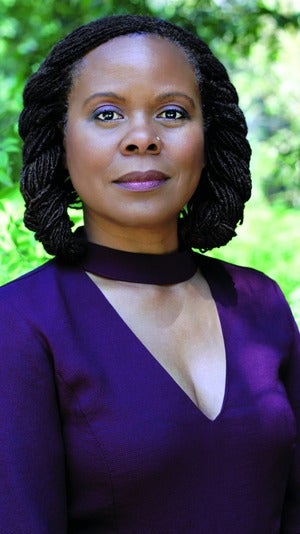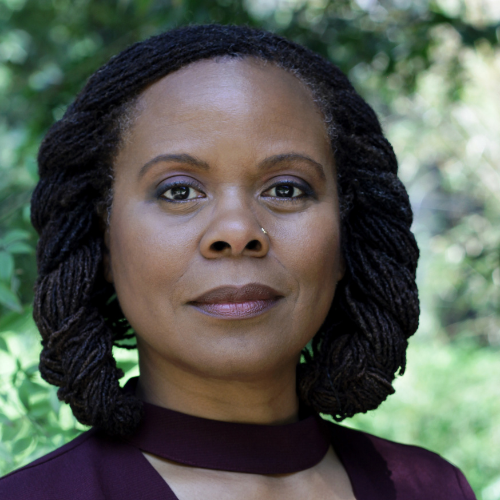Q&A: Racism, Policing, and COVID-19
Amid a pandemic that has disproportionately hit communities of color and nationwide protests in response to racialized policing, the founding director of FSPH’s Center for the Study of Racism, Social Justice & Health weighs in.

BEFORE THE CURRENT NATIONAL RECKONING with structural racism, Chandra Ford had been making the case that public health professionals and academics must do more to confront an issue that fuels health disparities and acts as a formidable barrier to optimal health. Ford, Fielding School professor of community health sciences, is the founding director of FSPH’s Center for the Study of Racism, Social Justice & Health and co-editor of “Racism: Science & Tools for the Public Health Professional,” a 2019 book in which researchers and community organizers — including 10 FSPH faculty, doctoral students, and alumni — explain how various forms of racism impede health and recommend strategies people in public health can use to address the problem. Ford spoke with FSPH’s UCLA Public Health magazine about the historic events of 2020, her center’s work, and where we go from here.
Q: In what sense do you see the uprising that began after the police killings of George Floyd and Breonna Taylor as a public health issue?
A: First, I view this protest against policing in a broader sense than the Black Lives Matter issue. What I see is an effort to preserve white supremacy in the face of major threats to it — and by white supremacy, I don’t mean simply a group that has white skin and a dominant role, but a whole set of principles, philosophies, and structures of inequality that help to keep some groups marginalized and other groups central to the flow of resources and power within our society. That Black people routinely experience being both innocent of any crime yet victimized by racialized policing has become more visible. And public health allows us to recognize that a body lying in the street with no physical life left in it represents the final stage of the life course, but that there are also many intermediate health outcomes that individuals experience. If someone has an adverse encounter with police and doesn’t die, but later starts practicing behaviors that lead them to develop cardiovascular disease or problems with substance use, their death record won’t say anything about policing, but in fact it might be tied to that experience. Mental health challenges include worrying about how to teach one’s children to survive in a hostile social environment, as well as the physical health consequences of exposures to everyday microaggressions of racism. It’s not just death, but the threat of it as well as living in a toxic climate in which one’s life is devalued that keep people from attaining optimal health.
For all these reasons, racialized policing is absolutely a public health issue.
Q: What role does structural racism play in the higher rates of COVID-19 and poorer COVID-19 outcomes being experienced by racial and ethnic minority communities?
A: There are so many ways in which racism is relevant, and there is not enough research in this area. We know, for instance, that implicit biases exist among health care providers. Whether a person receives COVID-19 testing doesn’t just come down to access; other considerations may include what was their experience the last time they went to the health care provider? In addition, particular groups of people are more likely to be exposed by virtue of the type of job they have. African American women make up a large percentage of nurses and nursing aides whose work requires them to be intimately involved with people who are sick with coronavirus or other conditions. Yet, we don’t often think about other frontline workers such as cafeteria and janitorial staff. From research, we know that the physiological stress tied to chronic exposure to racism is in part related to the level of agency a person can exercise to address the social exposures. So, for instance, a doctor and a housekeeper may have similar levels of exposure to patients with COVID-19 in a hospital, but the doctor can make decisions that the housekeeping person can’t about what they will or will not do, and what kinds of protections they require.
Q: What is the major focus of your center in addressing COVID-19 inequities?
A: We formed the COVID-19 Task Force on Racism & Equity in March, and have built an interdisciplinary, inter-institutional collaboration that has sought to reach out to the public, public health agencies, and policymakers to explain how, based on our knowledge of how racism and other forms of social inequality work, we are very concerned about disproportionate rates of COVID-19 in socially marginalized communities. Recently, the task force launched a study to capture the experiences of racial and ethnic minorities during the COVID-19 pandemic. We will be conducting virtual focus groups as well as follow-up interviews to understand how everyday lives are affected by this pandemic, and what people need in order to trust the health care system and access the resources that are available. In addition, we will analyze social media data to explore how these things are happening on a real-time basis.

Q: You received the 2019 Faculty Teaching Award from FSPH’s Public Health Student Association, and master’s and doctoral students play active roles in your center. What is it about teaching and mentoring students that is so important to you?
A: Our students really are phenomenal. To my knowledge, this center was the first in the country to focus explicitly on racism as a public health issue. One of the purposes is to create a space where students from diverse disciplines, and with different interests and approaches, can do research, scholarship, and public health community engagement in ways that are both bold and rooted in public health science, theory, and pedagogy. It’s not just that they protest; rather, the ways in which they go about pursuing justice and equity reflect the highest caliber of what our school has to offer. By coming together, we build more than any of us could accomplish alone, and we can all push one another to more sophisticated levels in carrying out our work, while serving as a supportive intellectual community.
Recently I was looking at some pictures from our center, and as I looked at one it dawned on me that this was a group of eight to nine doctoral students of color advancing original work on racism and health. I felt butterflies as I thought about how rare that is in our nation, and in that moment I knew we were beginning to accomplish what I had hoped for with this center.
Q: What compelled you to take on the role of co-editor for “Racism: Science & Tools for the Public Health Professional”?
A: I felt very privileged when APHA Press invited me to lead that project at the suggestion of Derek Griffith of Vanderbilt University, whom APHA Press had initially invited. For as long as I’ve been doing this work, I have felt like few people appreciate that addressing racism should be a central part of the work of public health, not something on the field’s margins. Racism impedes the achievement of equity and health for all. I felt a professional responsibility to move the scientific and other information about racism out into the broader field so that public health professionals working on the field’s front lines could make a difference by addressing it not only within society, but also as it operates within our field.
Q: What are some concrete actions public health institutions should be taking to combat racism?
A: The first thing is naming racism explicitly. This is changing over time, but it’s difficult for me to think of another risk factor where people who study it are routinely told that it’s inappropriate or impolite to name it, even when one is presenting empirical findings about it. We also need to work on truly hearing the perspectives of Black, Indigenous, and other communities of color, and valuing them by allowing them to exercise equal power as partners in research collaborations, rather than treating their contributions as mere footnotes. And we must invest in our students of color in ways that make our educational institutions places where they can thrive. There are simple, practical steps that public health professionals can take to address racism in our society. But, we also have to look in the mirror and really see our imperfect selves.
Racism impedes the achievement of equity and health for all.
Q: What do you hope comes from this period of reckoning with structural racism?
A: I’m looking to see that the people who have been involved with this work over the long haul are the ones who are directing the kinds of structural changes we need. There are individuals who have been championing these struggles for a long time. If those kinds of folks are not central to the efforts to solve the problem, I will be skeptical about the depth of the commitment to real structural change.
I’m also concerned about the disproportionate focus on egregious overt forms of racism without actually doing the underlying work needed to become a fully equitable society. I start one of the courses I teach by saying that the purpose is to get us beyond thinking simplistically that “racism is bad.” In the current climate, critical race theorists worry about how easy it is to point to white supremacists in the streets as indicators of “bad racism,” while at the same time ignoring the more nuanced ways in which structural racism persists, guaranteeing the preservation of white supremacy and reinforcing the exclusion of people of color.
I don’t think the solution is one that will come by next year, and I would be suspicious if it did. The way critical race theorists understand racialization is that the appearance of equity can be weaponized in ways that silence those most impacted by racism, dismissing any concerns they raise about their continued experiences with underlying inequality. My focus is not on the outcomes of this moment, but on the process. I don’t know what the right outcome should look like — the ideal world might look very different from what any of us has conceptualized. But I’m optimistic because I am committed to taking one good step each day. I have faith that others will join my colleagues and me on that path — and through that process we will get to something that is far better than what any of us right now can imagine.
